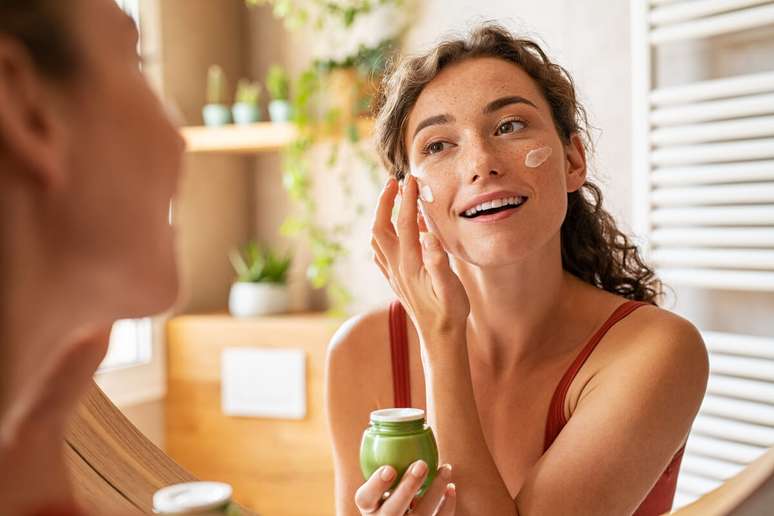Products with this component have a calming action and help keep the skin healthy.
Several studies have demonstrated the importance of consuming probiotics, known as “good bacteria”, both through food and supplements. However, this trend is now branching out into skincare, with the words “probiotics,” “prebiotics,” and “fermented ingredients” increasingly being found on skincare product labels.
html[data-range=”xlarge”] figure image img.img-d9a4c7d4702080d80633355c25d3c235pgwen18r { width: 774px; height: 516px; }HTML[data-range=”large”] figure image img.img-d9a4c7d4702080d80633355c25d3c235pgwen18r { width: 548px; height: 365px; }HTML[data-range=”small”] figure figure img.img-d9a4c7d4702080d80633355c25d3c235pgwen18r, html[data-range=”medium”] figure image img.img-d9a4c7d4702080d80633355c25d3c235pgwen18r { width: 564px; height: 376px; }
“More recently we have seen topical formulations, in creams, serums and lotions, rich in probiotics, which help in the treatment of acne, couperose, atopic dermatitis, hyper-reactive and sensitive skin, but are also starting to arrive in products intended to combat ‘inflammation and aging of the skin’, comments the dermatologist Dr. Lilian Brasileiro, member of the Brazilian Society of Dermatology.
Who should use?
The indication must always be made by the dermatologist, based on the needs of the patient’s skin. Also, it all depends on the lifestyle. “In general, patients who do not follow a balanced diet or who work in cities where the air quality is not good, can benefit, because free radicals generated by poor nutrition and pollution cause inflammation and probiotics can help fight it,” adds the doctor.
Allies for skin health
Similar to oral probiotic treatments, which aim to treat and prevent stomach issues, topical versions are known for their calming effects on the skin, harnessing a surge of good bacteria to help cells thrive or control inflammation.
The skin (our body’s largest organ), to protect itself from environmental aggressions, needs to remain unaltered and one of its greatest allies are probiotics, according to the dermatologist. “The skin microbiota controls the colonization of potentially pathogenic organisms, modulates the immune response, the skin barrier function and is an integral part of the skin health.“, explains the doctor.
Also according to Dr. Lilian Brasileiro, “studies indicate that changes in skin microflora play a significant role in conditions such as atopic dermatitis, psoriasis, acne and skin cancer.”
Recover your skin with the help of probiotics
Skin problems can be caused by our lifestyle. “Taking care of the skin microbiota is especially important now, because, due to our modern lifestyles, with hot showers and unbalanced diets, this delicate ecosystem is under constant attack that throws off its balance, which can lead to skins more dry, inflamed, stressed and sensitive , as well as favoring the establishment, proliferation and strengthening of pathogenic bacteria, that is, which can cause skin diseases”, explains the dermatologist, who adds: “Probiotics, in this equation, help to rebuild this healthy skin ecosystem,” says Dr. Lilian from Brazil.
Counteracts skin aging
Another interesting purpose of probiotics is the reconstruction of the skin’s protective barrier, especially after ablative laser treatments, peelings and the use of acids. “The idea is to speed up cell renewal to restore the skin barrier, helping the patient have a better recovery and outcome,” says the doctor.
Also, the applicability of good bacteria in creams that help fight the signs of aging it is beneficial for the skin: “all the essential functions of these products are enhanced, because a product with probiotics also improves the skin’s natural protection, promoting a faster recovery of the barrier, practically being a shield against harmful agents, at the same time which reduces inflammation.

Quick guide on whether I should include probiotics in my skincare
Do you have sensitive or very dry skin?
Probiotics have the intelligent ability to rebuild and strengthen the skin barrier. Sensitive skin takes a little longer to repair after damage, but incorporating probiotics into your skincare regimen helps speed up the process. “Patients with dry and sensitive skin benefit from the use of probiotics, as they promote a significant increase in ceramide levels in the stratum corneum, also improving hydration, as well as helping to reduce redness“, says Dr. Lilian Brasileiro.
Are you exposed to pollution?
Free radicals from exposure to pollution have the ability to accelerate skin aging, but probiotics can boost your skin’s natural defenses. “Probiotics calm the natural triggers of inflammation in the skin that can be greatly stimulated by pollution and stress, and reduce the damage done to collagen and elastin,” says the dermatologist.
Are you prone to acne?
“Topical probiotics and their syntheses have been shown to be effective in treating acne. They work to reduce redness, size acne lesion and improve the skin barrier in patients with acne,” argues the doctor.
But, in addition to using products with probiotics, it is important to take some precautions to prevent the skin microbiota from being damaged. For example, it is important to always choose to take cold or, at best, lukewarm baths, as hot water removes the skin’s protective barrier and beneficial bacteria, making it more prone to external aggressors and pathogens, advises Dr. Brazilian Lillian.
Another caution concerns the excessive use of soaps. “Cleansing this skin too much, without replacing the moisture, can cause dryness and affect the microbiome, which makes skin dryness and sensitivity worse,” he says.
Keeping an eye on the food
To strengthen the performance of probiotics on the skin and treat diseases, it is also essential to invest in a balanced diet, which, in addition to contributing to skin health and the maintenance of the skin microbiome, also helps in the balance of the intestinal microbiota , which, for have a direct impact on inflammation e immune modulationis also related to skin health, according to nutritionist Dr. Marcella Garcez, director and professor at the Brazilian Association of Nutrology (ABRAN).
Therefore, also focus on the oral consumption of probiotics, which are found in fermented foods, such as kombucha and miso, and in some cheeses and yogurt. “It is also worth investing in prebiotics, natural components present in foods such as oats, garlic, onions, berries and bananas which, when they reach the intestine, promote growth of beneficial bacteria, i.e. probiotics,” he recommends.
“On the other hand, sweets, deep-fried and ultra-processed foods, rich in salt, refined sugars, saturated and trans fats, should be avoided, as they favor the proliferation of harmful bacteria that cause inflammation and reduce the immune system”, he concludes. .
Source: Terra
Ben Stock is a lifestyle journalist and author at Gossipify. He writes about topics such as health, wellness, travel, food and home decor. He provides practical advice and inspiration to improve well-being, keeps readers up to date with latest lifestyle news and trends, known for his engaging writing style, in-depth analysis and unique perspectives.







-to4mi28diwq8.jpg)

